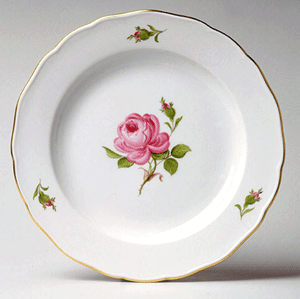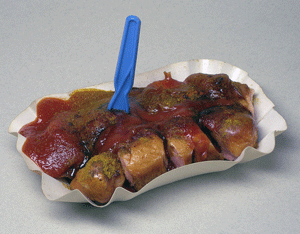Now Available
for the fiftieth anniversary of the first permanent SIGINT collection presence on Teufelsberg, the operational home of Field Station Berlin
Currywurst—the wrong way
Currywurst—the right way |
From T.H.E. Hill, the author of Chapter 1: Welcome Back to Berlin Why do face wounds bleed so much? I had to buy a new shirt. I never could get the blood out of the one I had on that night. And I hate European shirts. They never fit right. It was a great way to start my return to Berlin. I knew that I was going to run into a few ghosts of Berlin past, but I had no idea that they’d be so displeased to see me, and so physical about it. I walked up to her and said, “Ilse?” I couldn’t think of anything else to say. “Long time no see” seemed too casual. “I know I hurt you” seemed too cavalier. She stared in my direction with a blank look, the kind you give people when they expect you to recognize them but you don’t. Thirty-five years can do more to change your face than a Station disguise kit. “I beg your pardon,” she said. “I don’t recall meeting …” Before she could say the word “you,” the memory hit her. I could see it in the change in her eyes. They went wide. Without even blinking, she hit me in the face with the plate of *currywurst she was holding in her right hand. The plate was Meissen, pre-war from the look of it. It’s a shame about the Meissen plate, probably irreplaceable. I don’t think she was conscious of the plate. She probably just wanted to slap me, and forgot she had the plate in her hand. I guess you could say she wasn’t pleased to see me again after all those years. My host came running over to see what all the commotion was about. |
“Mother!” he said, trying to sound calm. “What’s going on?”
The curry in the sauce stung my face. Currywurst was one of the Berlin specialties that I’d missed. I’d never found currywurst anywhere else in the world that tasted as good. My preference, however, was to shovel it into my mouth with a plastic fork from a paper plate. Having it plastered on the side of my face with a piece of shattering Meissen china was never going to make my top ten ways of eating it. To eat it, you need to get it in your mouth, and not on your face and shirt.
The sauce was the same color as the blood that was streaming down onto my shirt, so my host didn’t notice right away. I, on the other hand, did notice that he’d called her ‘mother.’ That meant that the complexity of my problem with Ilse had just been squared. My host was the Director of the *Stasi Archives where I was going to do research while on fellowship to the American Academy in Berlin.
I had the feeling that once he learned why she hit me with a plate of currywurst, I’d be lucky to be shown a bag of shredded Stasi files before they went through that miracle computer system that the Fraunhofer Institute had cooked up for the Archives to reassemble them.
Ilse walked off, ignoring her son.
“I can’t apologize enough for my mother, Doctor Troyan,” he said in American accented English. “I can’t imagine why she would do something like that. Let me help you clean up,” he continued, putting a linen napkin in my hand.
It looked to be damask. They’d never get it clean enough to use again.
Oh, well. In for a penny, in for a pound, as they say. I put the napkin up to my face and wiped off the bloody currywurst sauce, revealing a three-inch cut on the left side of my face. It started to ooze red again as soon as I finished the first swipe to clean up.
“Mein lieber Gott!” said Professor Johnson, reverting to his mother’s native German. By this time Ilse was almost at the front door. “Mutti! Was hast du gemacht!?” he yelled in her direction, but I doubt she heard him. She just kept right on going, through the door and out into the night.
“We’ll have to get you to the hospital,” he said hurriedly, recovering his efficient Germanic sense of prioritization, and combining it with direct action. He grabbed another napkin from the pretty brunet on his right who had come over to see what was going on, and was staring speechlessly in my direction with her mouth wide open. Her napkin had a lipstick smudge on it. That was OK. It looked like a good color match for my blood.
“Manfred!” he yelled.
A starched and pressed butler appeared by his side almost by magic. I hadn’t seen him anywhere nearby.
“Mein Auto, und schnell!” he instructed the butler, who vanished just as quickly as he had appeared.
The next thing I knew we were headed for the same door through which Ilse had disappeared. A brand-new Mercedes pulled up silently as we walked out the door. The butler had the car door open before we crossed from the house to the drive.
I had a sense of déjà vu, but that was a back street in Damascus, and the white cloth on my face then was soaked with chloroform rather than blood. And it wasn’t damask either. I survived that trip, but not by much. There seemed to be sufficient reason to suspect that I’d survive this one too.
“To the hospital! And put your foot down!” commanded Professor Johnson in German.
The tires screeched as we left, and they screeched as we stopped in front of the emergency room entrance. Professor Johnson had called ahead on his cell phone and there was a team with a gurney waiting for us at the door. I was flat on my back and careening through the hall to a triage room faster than you could say Krankenbahre, which is German for gurney. Strange the way you remember words that you haven’t used for years. It was a word that Ilse had taught me, and now she was the reason I remembered it.
They wheeled me under a bright light that made me shut my eyes. A cool, calm, deliciously female voice said, “Und was haben wir hier?” Her voice was competition for Marlene Dietrich at her best. It had that wistful quality that makes a woman’s voice worth listening to.
“The gentleman is an American,” said Professor Johnson.
“That’s no problem,” said Marlene’s voice, this time with a clearly American accent. “I did part of my residency in Chicago. Let’s take a look at your face,” she said. “If you’ll just remove your hand, I can see what’s wrong.”
I picked up my hand, leaving the napkin in place.
A shapely hand in a surgical glove lifted the napkin, but had to tug a little, indicating that the blood had begun to dry. An encouraging sign.
“A gentleman of your age, dueling? You should be ashamed of yourself. This is Berlin, not Heidelberg.”
I tried to smile, but it hurt.
“The patient appears lucid,” she said to the nurse in green scrubs with a computer tablet who made a note of that.
Marlene’s voice turned to me again and said, “Please lie still, and try not to smile or talk. It will only make the wound start bleeding again.”
She dismissed Professor Johnson with a wave of her hand.
He hesitated.
“You’re still here,” she said.
The nurse showed him the door.
Fifteen minutes later I was sitting up with twelve stitches in my face. I was something to look at, with my bloodstained shirt and a huge bandage on my head. It made me look like the mummy at a Frankenstein audition.
“No talking, no smiling, and no solid food,” said the doctor who looked as good as her voice sounded. “Moving those muscles will tear out my stitches and make it start bleeding again. If you do that, I’ll use a square needle to put them back again, and no anesthetic.”
I pulled out my iTouch and thumbed a brief note for her to read on‑screen. “Thanks, doc. How long?”
“At least three weeks,” she replied.
“And the bandages?” I thumbed.
“The whole time. They are not just there to hold the dressing in place, but also to keep you from moving your jaw, which is what I suspect induced the lady to hit you with a plate of currywurst in the first place.”
“The lady?” I thumbed. “Why think that?”
“You’re not going to try and tell me that the suit who brought you in here hit you, are you? He’d have given you a black eye.”
“His mother,” I thumbed.
“How civilized of him to bring you,” she replied.
“Follow my finger with your eyes,” she instructed.
I did as I was told.
“There is no apparent problem with your eye. The cut was very close to it,” she said. “When the bandages come off, you can either have plastic surgery to remove the scar, or you can just tell people that you went to school in Heidelberg,” she joked.
“Ha, ha,” I thumbed.
She smiled. “I recommend flowers for the lady, whether it was your fault or not, but especially if it was your fault.”
“Mea culpa,” I thumbed.
“In that case, my prescription is for roses, blood-red roses. A dozen, twice a day, until the inflammation subsides.”
“Candy?” I thumbed.
“I think not. Perhaps an order of currywurst would be better,” she said with a wink.
“U think?” I thumbed.
“Certainly. That will remind her of what she did to your face. Stand up,” she instructed.
I pressed my hands on the examining table and pushed off into a more or less acceptable dismount.
“You seem none the worse for wear,” she said. “You can go.”
The left side of my face was numb from all the anesthetic she had pumped into it so that she could sew it up. She said that the pain would catch up with me later, and it did, with a vengeance.
“Take two aspirin, and drink through a straw,” she’d said.
I had the sneaking suspicion that she was on Ilse’s side. She knew it was going to hurt, and that the aspirin wouldn’t help much. It didn’t.
I walked out into the hall. Professor Johnson was at the end of it, sitting on an uncomfortable-looking couch.
“My mother won’t pick up her phone,” said Professor Johnson with more than a slight note of hostility in his voice. It seemed directed at me. “Why did she hit you?”
The answer to that wouldn’t fit on the screen of my iTouch, or in a paper-back novel for that matter. I was glad that the doctor had told me to keep my mouth shut. It gave me an excuse not to say anything now.
“Can’t talk - doc’s orders - pull out stitches,” I thumbed.
That didn’t improve his mood, and he hit a speed-dial combination on his cell. I listened to the phone ringing for a minute until it switched him to Ilse’s voice mail. The sound of her voice brought back memories. He didn’t leave a message.
The ride back to the American Academy in Berlin on the Wannsee in the building that used to be the American Officers’ Club took about 15 minutes. Neither one of us talked, but we were both doing a lot of thinking.
Welcome back to Berlin.


